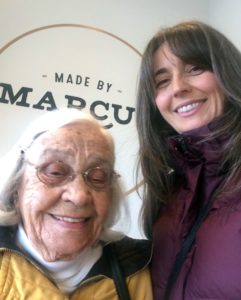Four years ago, my mother had a stroke. She now has vascular dementia, which is not exactly the same as Alzheimer’s. There is a tendency to lump all dementias together, but there are actually several different kinds of memory loss. Vascular dementia is caused by brain damage from impaired blood flow to the brain, and its progress is neither predictable nor consistent. Cognitive changes occur step-like, but there are plateaus where the person’s memory holds steady followed by sudden changes. During each plateau I accustom myself until a new step occurs, inviting a new grief.
Most difficult for me has been the loss of abilities that, to my mind, most clearly identify my mother. For example, my mother can no longer remember how to bake the German cakes which for decades have marked the seasons of our family life – Schwartzwälderkirchtorte on my birthday, Sachertorte on my father’s. These cakes symbolized her love for us. What happens to my mother’s love now that the symbols of that love are gone? Loss of memory can feel like the loss of a person, a death before death. In fact, the social worker assigned to help me calls it ‘ambiguous grief’ because the losses occur repeatedly without finality.
Recently I attended a liturgical congress for which the theme was anamnesis, or liturgical remembering. My earlier reflections on memory had to do with the memorization of liturgical texts, and how the things we remember become part of us and identify us with certain cultures and communities. I found myself wondering: if my mother no longer remembers the things that identified her, who – and whose – is she?
One of the papers at the conference, given by Rev. Prof. Liam Tracey (OSM), was about worship in the age of dementia. Tracey referred to the practical theology of John Swinton, who proposes that we are not what we remember – rather, God remembers us. Although it may be satisfying to use memory to construct our own identity and to connect with others, Tracey explained that God’s memory is not a neurological act; we are not as we think. One of the things experts say is that when you visit people with dementia you have to enter into their reality. While I tend to identify my mother in relation to how I remember her, a spirituality of dementia invites me to consider instead how God remembers.
When we recall God’s saving deeds in the Eucharistic Prayer of the Mass, we fulfill Christ’s command to “do this in memory of me.” This anamnesis is distinct from non-liturgical recollection, in that it actually makes the past events of salvation present again. It is not our individual memory of what God did for us in Jesus Christ, but God’s memory given to us in the liturgy that continues to save us. Although I grieve the changes in my mother’s cognition, her being is not ultimately determined by what she can remember. Losing memory does not have to mean a loss of identity because, as my faith tells me, it is God who remembers.









Pingback: We Are Not What We Remember | Simone Brosig